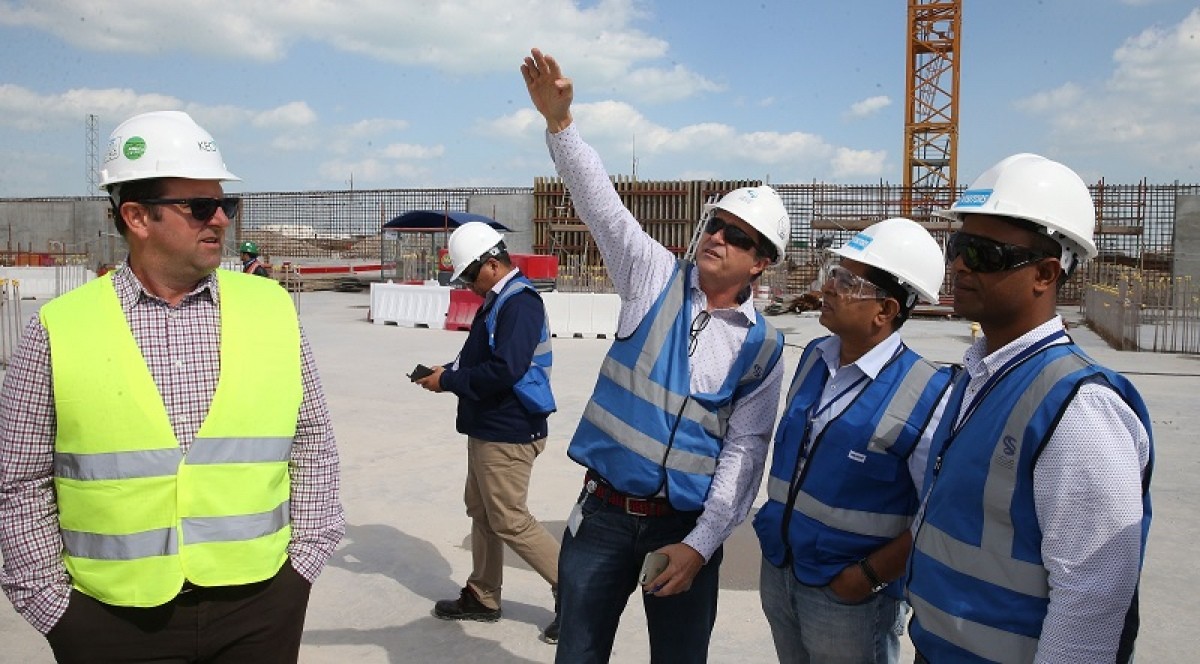.jpg)
_1-itok=GFMKQ6A9.jpg)
A group of 25 prominent engineers drawn from the many resident communities of Qatar have praised the work being carried out at Al Wakrah Stadium following a technical presentation and tour of the site by their counterparts from the Supreme Committee for Delivery & Legacy (SC).
The engineers – who visited the 40,000-capacity proposed venue of the 2022 FIFA World Cup Qatar™ for a knowledge-sharing session – were drawn from the communities who had signed a Memorandum of Understanding with the SC in November 2015 and June 2016 pledging support for the host nation's preparations for the first ever FIFA World Cup™ in the Middle East.
The stadium, scheduled to host matches till the quarter-finals in 2022, received lavish praise for its futuristic design by iconic architect Zaha Hadid. The visiting engineers also were impressed with the health and safety procedures followed by the SC in the construction of the stadium.
"The stadium marries technical simplicity of modern engineering with a futuristic design, and it is quite amazing how well this unlikely fusion is achieved," said Mohsen Refaat, a civil engineer from the Egyptian resident community.
"The technical excellence on display at the stadium is proof that Qatar will deliver an outstanding World Cup in 2022, a tournament which the Arab world and the greater Middle East can be proud of. As an Egyptian living in Qatar, it is an honour that I am able to contribute whatever I can towards making the historic tournament a success."
Refaat, who works at Qatar Petroleum Company (QAPCO), also praised the health and safety procedures being adopted while constructing the stadium.
"The elaborate care taken by the SC towards health and safety procedures in mega-stadium projects such as Al Wakrah is an example of Qatar's vision to accelerate social change through the 2022 World Cup," he said.
Another visitor, Vincent Argenton, who is originally from France but now living and working in Qatar, was also impressed with the health and safety best practices followed at Al Wakrah.
"The knowledge session focused on the health and safety aspects, which are critical in a project of such huge magnitude involving enormous workforce. I was happy to learn about the priority being given to this aspect which helps to save lives and protect the environment. I am confident that this will become common practice in Qatar going forward," he said.
Argenton, whose country hosted the 1998 FIFA World Cup™, also praised the design of the stadium. "The unique design inspired by local culture makes Al Wakrah Stadium an important legacy project of the 2022 World Cup," he said.
The Supreme Committee for Delivery & Legacy (SC) delivers amazing every day – to 2022 and beyond. To do so and to honour our commitment to Qatar and the Middle East, we believe in the necessity of a clear and defined vision, a mission to work towards and five enduring values.
The knowledge sharing session at the Al Wakrah Stadium is part of a series of SC workshops targeting leaders and professionals of resident communities of Qatar who are vital stakeholders of SC in the hosting of the first ever World Cup in the Middle East.
The workshops also seek to enhance industry standards in Qatar thereby paving the way for the creation of a knowledge-based economy for 2022 and beyond.

